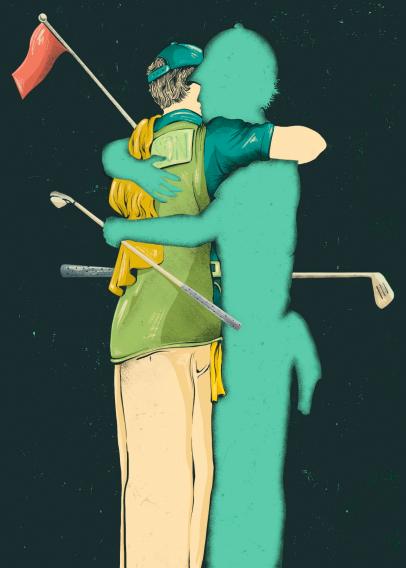News
These are the only things you need to know when taking a caddie

Golf has a lot of weird dynamics when you compare it with other sports—where to stand, what to say, what shoes to wear when and where.
Do these things matter? Not really! Any sensible person can figure most of it out quickly, which is also true for your first experience taking a caddie. If you’ve never taken one before, you should start with our 125-page step-by-step guide ... we're kidding. Actually, the first recommendation is to not overthink it. But just to be safe, let’s get some of your questions out of the way.
What am I paying?
Great question! There is no standard wage for caddies—on average, you can expect to pay somewhere between $80 and as much as twice that—but let’s assume your first caddie experience is either at a club where you are a guest, or at a resort. In both instances, just ask your host or the starter at the course what the going rate is, including tips.
Pro Tip #1: If you know before your round you are taking caddies, bring cash. Some accept Venmo, but not all, and credit cards are exceedingly rare.
Pro Tip #2: If you are invited to a club by a member, offer to pay for at least your caddie, and maybe theirs. It’s the classy thing to do, and helps your cause in getting an invite back.
So, they just carry your bag?
Yes, most, at bare minimum, will do that*, and it really is the best way to play. Taking a cart is possibly quicker, but not always so efficient and involves minimal exercise, while carrying your bag is the opposite—great exercise but tiring, and not always fast. There are all kinds of strategic benefits to a caddie we’ll get into shortly, but even just having someone responsible for your bag is an underrated pleasure.
*There is something called “forecaddies” that still involves carts, where the caddie basically carries your putter. It’s really not worth getting into here, and also kind of dumb.
Does the caddie tell me what to do?
Well, no, not exactly. A good caddie is there to help, and will provide some guidance on what club to hit and where to aim when putting. You are free to listen as little or as much as you like. Some people don’t want any information, while others reach a level of dependence with their caddie they can’t remember to exhale without them. It’s really you who decides what works for you and what doesn’t.
Should I feel bad about taking a caddie?
Are you planning on skipping out without paying? If not, then no. A caddie is providing a service, and many want to do a good job with all those tasks you feel you could be doing yourself: raking a bunker, replacing a divot, putting clubs back in the bag. Unless you are getting a strong vibe to the contrary, it’s OK to let them do their thing.
Where you should feel bad, Part 1: Don’t have a bag of stones in your bag. If it’s inordinately heavy, offer to lighten it.
Where you should feel bad, Part 2: Don’t blame the caddie for your poor execution. They’re there to help, but you’re the one who just lost a sleeve of balls on one hole.
Which brings up another question…
Can a caddie help me play better?
Absolutely! Again, there are limits, but a good caddie, or even an average one, can help in a bunch of ways big and small. We’ve already talked about the advantages of not carrying your bag, and walking the course still provides you a better sense for the contours of holes. Then there are the countless insights into specific shots that a caddie can provide: aim at that tree, favor this side, this green actually breaks left. The best caddie experiences are the ones where they feel more like your partner than your temporary employee. They want you to play well, and even if you chop it up, don’t stress. They’ve almost certainly seen worse.


